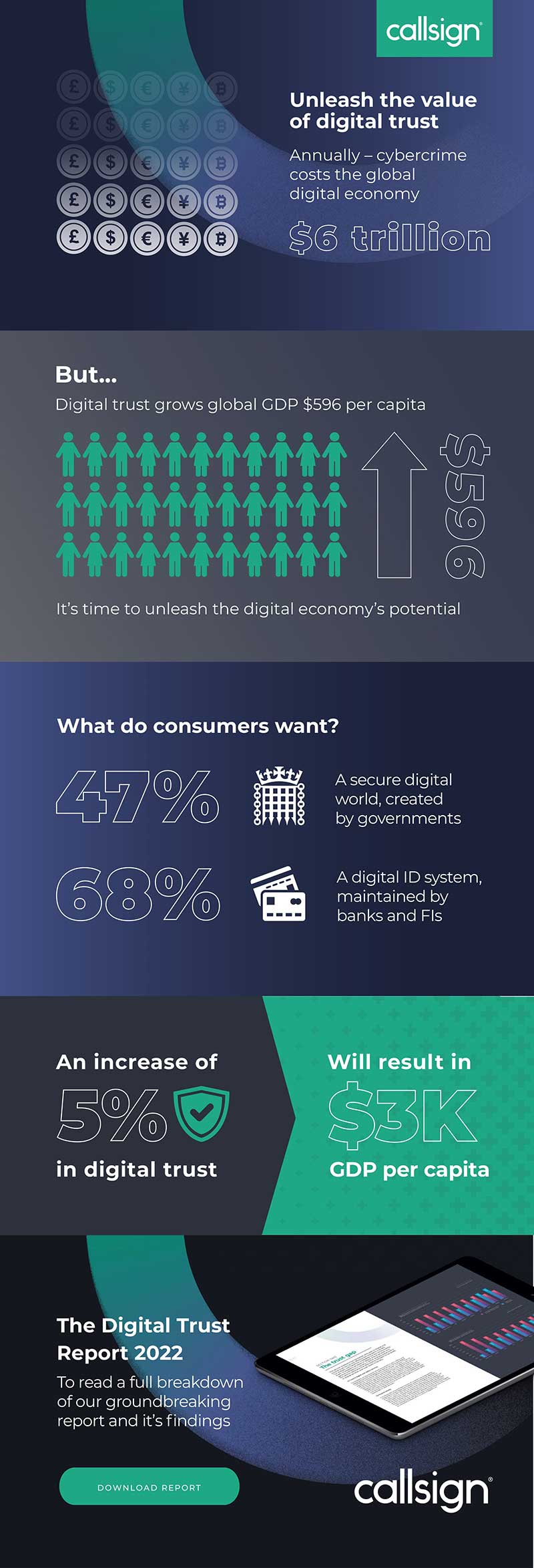Callsign, the digital identity pioneer, has released a report quantifying for the first time the value of digital trust to society and the economy. The research reveals the potential to build growth during the current global economic slowdown with a five percentage point increase in digital trust resulting in an average increase in GDP per capita of US$3,000.
The findings are revealed in The Digital Trust Index: The value of digital trust Report, which is seminal research, conducted by Callsign, the digital trust pioneer, and the Centre for Economics and Business Research (Cebr), into the attitudes and drivers of digital trust across modern economies. The findings are significant if the global economy tips into recession because investing in building digital trust into digital economies has the potential to deliver growth and productivity.
From a global total of 12,500 respondents, 2,500 came from Hong Kong, India, Indonesia, the Philippines, and Singapore.
“This Callsign research reveals the value of building digital trust to the global economy, and reflects the conversations and enquires we are engaging in. Organizations across the globe are looking at digital identity as the foundation to their digital ecosystem– delivering trusted interactions for consumer-to-business as well as business-to-business interactions. The research also demonstrates the negative impact if the industry doesn’t take proactive measures to address consumers’ building lack of digital trust,” says Julie Conroy, Head of Risk Insights at Aite-Novarica Group.
This increase in digital trust in Asia Pacific means a potentially significant increase to the size of the economy in the region. Critical to improving digital trust is the deployment of a regulated digital identity system.
Individual market GDP data points for APAC:
| 1% increase in digital trust impact on GDP | 5% increase in digital trust impact on GDP | |
| Singapore | US$3.4bn | US$17bn |
| Indonesia | US$161bn | US$807bn |
| Philippines | US$65bn | US$322bn |
Emerging digital trust gap
The report also found a ‘digital trust gap’ is emerging around the world. For APAC, the study found a positive digital trust gap, where digital trust is higher than societal trust.
Analysis found APAC markets have a positive digital trust gap of 5% while Western markets such as the US (-4%) had a negative trust gap (societal trust was higher than digital). This demonstrates that consumers in Asia Pacific have more trust in the digital economy than Western counterparts, offering potential economic advantage. 35% of APAC consumers surveyed claimed to have been affected by online fraud or a data breach which impacts their trust in online services.
Rapidly growing digital economy needs a regulated digital identity system
The digital economy is expected to grow to US$20.8 trillion* by 2025, while the cost of online crime to US$10.5 trillion.
With the rise in digital and online crime, 53% of APAC consumers expect governments to create a more secure digital world. 79% of APAC respondents support the creation of a digital identity system with almost a third saying banks and financial institutions are best placed to create and maintain the system.
Expectations in APAC of the deployment of a digital identity system quickly were much higher than other regions. 37% expect it to be rolled out in the next 12 months.
Namrata Jolly, General Manager Callsign, APAC said, “The opportunity in APAC from enhancing digital trust through digital identity is real and tangible. Consumers want and expect it to be part of their lives now. Their confidence in online experiences has improved in the last two years, which is the opposite response from consumers in Western markets.
This puts APAC at a real economic advantage as their levels of digital trust exceed societal trust. In the global digital economy, APAC appears poised to capitalise on the growth through the deployment of a secure and trusted digital identity system.”
To see the full Digital Trust Index report, visit https://www.callsign.com/digital-trust-index.



















